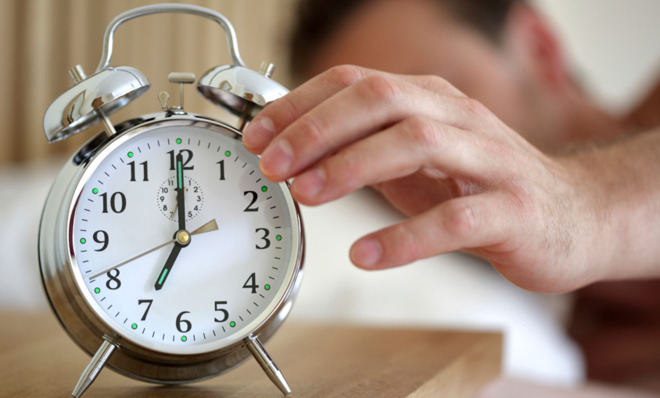A good night's sleep gives you an edge at work
It's true: Your co-workers are probably sleep deprived

A free daily email with the biggest news stories of the day – and the best features from TheWeek.com
You are now subscribed
Your newsletter sign-up was successful

It's true: Americans are not getting enough sleep. About a third of us are chronically sleep deprived, which affects our work, our relationships, and our health and well being.
The numbers tell the story: 10 times as many people today are sleeping less than six hours a night compared to a generation ago, according to Charles Czeisler, M.D., chief of the Division of Sleep Medicine at Brigham and Women's Hospital in Boston. In a talk he gave at TEDx Cambridge, Czeisler explained that even five-year-olds are getting less sleep than they did in earlier decades — as much as two fewer hours of sleep.
In the workplace, acute or chronic insomnia affects nearly 25 percent of all Americans, leading to 367 million lost workdays a year — and a cost to employers of nearly $63.2 billion annually in medical expenses and lost productivity, according to the 2013 Rx Sleep Survey done by Harris Interactive for Targeted Medical Pharma, Inc., a Los Angeles-based biotechnology company.
The Week
Escape your echo chamber. Get the facts behind the news, plus analysis from multiple perspectives.

Sign up for The Week's Free Newsletters
From our morning news briefing to a weekly Good News Newsletter, get the best of The Week delivered directly to your inbox.
From our morning news briefing to a weekly Good News Newsletter, get the best of The Week delivered directly to your inbox.
Why is this happening, and what can we do about it? Here are two key reasons we're getting less sleep than before.
1. We're exposed to too much light, especially before we go to bed. Our easy access to electricity and the increasing presence of electronic media in our bedrooms are keeping us awake.
Two major processes "affect how alert we are at any given moment," Czeisler explained in his talk. "One is how many hours we've slept [on a given night] and how long we've been awake. The second is an internal clock in the brain that times our tendency to feel alert and to feel sleepy."
Melatonin, the sleep-inducing hormone, is typically released an hour or two before we go to bed at night, he said — but light can suppress and shift that release.
A free daily email with the biggest news stories of the day – and the best features from TheWeek.com
2. We're overcaffeinated. We drink too much coffee and tea in the afternoon and after dinner, the very times we should be abstaining from it.
"Caffeine stays effective in the body for an alarmingly long amount of time — its half-life is between six and nine hours," wrote Michael Metcalf on the TEDx Salford website. "It interferes with the brain sensors that detect our body's need for sleep."
While the solutions to the two problems above seem obvious — sleep in a dark, quiet room and don't drink caffeinated drinks at night — the risks of not doing so seem even more compelling.
Our bodies need sleep to repair our cells. Our brains integrate and retain new concepts and experiences when we sleep well. We can concentrate better and perform our jobs with more accuracy and insight.
"Sleep is important for the way we think," said Patty Tucker, a sleep specialist and physician's assistant in the Napa Valley area. "Memory and learning are consolidated during REM sleep. Sleep is the most important tool we have in terms of maintaining not just our health but our creativity and productivity."
If we don't get enough sleep, we can become more distracted; more rigid and inflexible in our decision-making; more prone to burnout and depression; and more vulnerable to such diseases as obesity, diabetes, cardiovascular disease, infection, even cancer.
Dr. Czeisler shared these tips to address the problem:
- Make sleep a priority.
- Create a regular bedtime and regular wake time.
- Sleep in a cool, dark, quiet place.
- Create a media-free zone.
- Determine how much sleep you need without an alarm clock and caffeine.
In his own life, Czeisler keeps electronic gadgets and TVs far away from the bedroom — and "uses an old-fashioned incandescent light in the bathroom to avoid exposure to bright light at night," according to The Boston Globe. He also said he's "wary" of LEDs, which are prominent in our laptops, televisions and cellphones and may become even more abundant over time, as the incandescent bulb is phased out.
More from The Fiscal Times...
-
 How the FCC’s ‘equal time’ rule works
How the FCC’s ‘equal time’ rule worksIn the Spotlight The law is at the heart of the Colbert-CBS conflict
-
 What is the endgame in the DHS shutdown?
What is the endgame in the DHS shutdown?Today’s Big Question Democrats want to rein in ICE’s immigration crackdown
-
 ‘Poor time management isn’t just an inconvenience’
‘Poor time management isn’t just an inconvenience’Instant Opinion Opinion, comment and editorials of the day